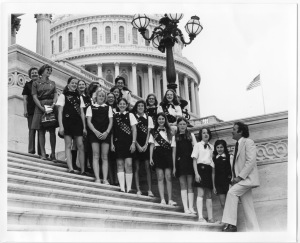That’s right, the 1970s was a hot decade—and not just for its music and fashion. During these years the debate over air-pollution legislation was practically ablaze. The people who knew this best were perhaps the congressmen and congresswomen dealing with the legislative process at the time. One such congressman, Connecticut’s own Stewart Brett McKinney, must have felt the heat first-hand, given the countless number of constituent letters he received just between 1974 and 1976—many of which can be found amongst his papers in the Political Collections here at the Dodd. In addition to serving as a member and minority leader in the CT State House of Representatives, McKinney was also elected to the U.S. House for Connecticut’s southwestern fourth district and served from 1970 until his death in 1987.
The letters McKinney received just in the aforementioned two-year-span—letters from private industry, organizations, and unaffiliated individuals—attest to the significance of environmental legislation at the time, seeing as a noteworthy portion of the correspondence deals with various proposed congressional amendments to the 1970 Clean Air Act. The Act set firm standards for energy providers, car emissions, etc. in an effort to curb air pollution and the negative environmental and health effects associated with it. Like many others at the time, congressman McKinney was in favor of modifying the 1970 act, but opposed to drastic changes that might weaken it. The challenge, as he stated in his response to a letter from Ms. D.W. Sweeney of Stamford, was to “balance those environmental goals with what is perceived to be the long-term energy needs of the nation” (S.M. to D.W.S.).
This was crucial given the energy crisis of the early ’70s. Even those companies that may have desired to switch from coal to the slightly less harmful alternatives of oil and gas may have been unable to do so, given the limited availability and high prices of these resources. Many businessmen therefore lobbied to have the 1970 act significantly amended and emissions standards deadlines extended while other groups—such as the League of Women Voters—urged Congressman McKinney to fight to maintain the original, strict environmental standards. For instance, in his July 1, 1975 letter to another Stamford resident Joel M. Berns, D.M.D, McKinney makes it clear that “we must avoid the irresponsible course of so weakening the Clean Air Act in the name of the ‘energy crisis’ only to face the same deferred problems five or ten years from now when the clean-up job will be far more difficult and costly” (S.M. to J.B.).
Krisela Karaja, Student Intern

